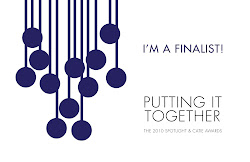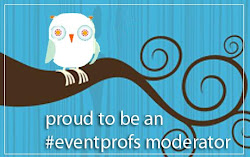
I am home from my second event conference of the year and after a successful week of networking, attending great events and teaching (however successfully) classes, I find myself reflecting again on a perpetual question-argument-debate at every conference. Just what is event education supposed to be about?
At each conference this year I was fairly disappointing with the turnout in the education sessions. Feel free to blame the speaker (me) or the timing (last day, early). Here I was, about to teach a class, in a massive room with, in one case, (ugh), convention theater seating, and in the second case, (ugh), classroom tables for rows set-up and the always to be expected one participant per row
First, my soap box: Come on people! We are in the event business - we have to do a better job at designing breakout and general session spaces to be conductive of learning. Why do we insist on putting so many barriers in the way of interactivity: a podium on a riser (for 20 people, really.) Classroom tables. Uncomfortable theater seating, where I have to put two chairs in-between myself and the next person because A) I don't fit in the chair with no gap between myself and my neighbor and B) because I am lugging around this big conference bag of materials. While "comfortable" and expected, these items act as barriers between a speaker and the audience. And if you believe, like me, that education more about facilitated dialogue among the crowd and less about what I the speaker know, then these set-up really just get in the way. (And don't ask me about the screen which was set back at an angle such that 1/3 of the room couldn't see it!)
But to the bigger question. Staging conference education is a lot like staging an event. In any given audience you will have someone enthralled with what you do, someone bored silly with what you do, someone who is passing time, but the content will sink in later, and someone distracted by the latest disaster/news being reported 140 characters at a time over their mobile device. It is a vast audience with so many specific ideas and needs it will make your head spin. The repetitive issues seem always to be the same: Content is too junior! Content is too senior. Content is lacking all together.
So what is the deal? Here are my rules:
1. People want content. (period.) Celebrity status means nothing anymore and doesn't cut it to fill an hour. Sexy titles may win selection, but often are empty...and more and more crowds will walk out of classes in which nothing is being said. Audiences want solutions (to their issues) and ideas.
2. Let the audience provide your content. Who knows what they want better than the audience. So let them talk. Whether they enjoy participation or not, the most successful solution to education is a facilitated conversation among the audience by a great facilitator because the audience is smart. And we can not forget that they are smart.
As a session speaker I have taken this one specifically to heart and open my sessions with the following:
"This class is a conversation. I want to hear from you. I want to know if you agree with me or think I am full of it. Yes, I have things to say and have prepared a presentation, but I am just fine throwing that out of the window to discuss what you want to talk about. Because this class is about you (the audience) not about me. Your education is in your hands, so tell me what you want to hear."
3. Aim high with course work and provide challenging content. Again your audience is smart - so stop talking down to them. Engage them where they are at with a discussion that they want to have. But don't forget a track for the newby's. But be cautious. There is often a belief to make education experienced based, but I think education should be comfort based. Newby doesn't mean beginners or young people and Expert or MASTER doesn't mean old or experienced. Rather, each should speak to those who feel more or less confident on a given topic.
4. Look beyond the borders of your industry. There is so much knowledge and learning that can happen by linking relative outsiders to the industry for dialogue. You have to invest in good education content, not rely on free volunteers. Or your audience will stop attending.
5. We are in the experience business. So why is education presented in classrooms. Get out. Walk around. Sit comfortably. Engage in the environments around you and in the event experiences around you. Every one of these conferences stages events, and yet the integration of those experiences into the educational track is not to be found. Turn those events into more purposeful parties: make them learning opportunities.






Ryan,I appreciate your thoughts and comments on event education. I failed miserably at my first attempt at TSE (you know very well;you were there!)& let my partners illnesss & inability to co-present with me throw a huge curve ball I couldn't dodge.Every time I think about that presentation I cringe and suffer the embarrassment all over. And everything you pointed to in your critique of how things are curently done was present at my presentation. One person per row. Too large a room. Theatre style seating. Add to this a very nervous & discombobulated presenter and it was a recipe for disaster. Knowing now what I wish I knew then I would not have caved when my partner couldn't make it. I would not have talked 90 mph and kept looking at the clock. I would have drawn on my theatre training and been more composed and engaged the audience more(perhaps fewer would have left!).Anyway my point is you have some very valid points and I offer my support to re-design or re-vamp or re-think or review the status quo of event education environment and perhaps tailor the environment to the presentaion/topic. Example: my topic would have worked well for a round-table discussion, or sitting on towels around the pool or in a cabana...you get my drift. And while I'm here allow me to publicly thank you again for helping me out that day with the worlds fastest power point put-together...it may be a record! Regards, Alice-Lynne
ReplyDeleteRyan:
ReplyDeleteYou offer some great points. The challenge is getting conference and event organizers to consider them. It's about the fundamental shift of moving toward being attendee-centric and what's in the best interest of the attendee or learner. This is a challenging shift for some.
Keep pushing the boundaries and asking others to do it differently!
Jeff: And why is it that it is such a stretch to be attendee-centric? It seems so obvious - and maybe it is just that simple.
ReplyDeleteAnd for me it stretches beyond just content into the design of the complete experience. When I was a corporate planner and those interested would ask me for a quick tip for making a more successful event, I would always say, walk your event as an attendee. Forget everything you know and planned and walk in their shoes before the event starts. Find out where they get lost. See where the signage is bad or unclear? Figure out which chair can't see the screen or where the audio doesn't sound right. Pick up your mobile device and discover where you can't get service. Learn those lessons and then fix them so the attendee experience is as valuable as possible. Then the content become absorbable, in that fine-tuned environment.
And creating that perfect package is the great challenge of design. At the end of the day, the purpose of an event is to communicate the brand-the mission-the objectives of an organization (the planner) packaged for the audience in a desirable experience. Successful event design is about getting people talking about what you want them to talk about.
First...I enjoyed your presentation but would have loved it to be a more intimate setting!
ReplyDeleteSecond...I totally agree on bringing in diverse speakers...ones that stretch the box a bit. We all keep our eyes on those around us but can really have our eyes OPENED by new things outside our spere of comfort.
Julie
Many years ago I went to a conferece for Early Learning and the lead speaker was Rob Grunewald from the Federal Reserve Bank of Minneapolis, I mean he's not a teacher or a parent so what does he know... At first it seemed weird but his points about the financial benefits for society to have children in Early Learning were so eye opening I still remember him today. I couldn't tell you who any of the other presenters were!